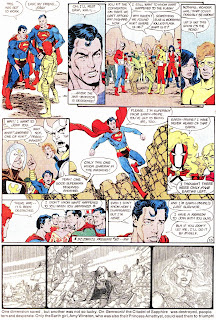
Well, it didn't, but it did convince DC to park Hawkman in limbo for about five years until Geoff Johns had the good sense to simply pick one Hawkman and basically ignore any other versions as much as possible. So, Hawkman was established as Carter Hall, an archeologist who was really the reincarnation of an Egyptian Pharoh, and so on, not the best origin, but it worked...until DC decided to screw around with it...
 Yep, it was all a lie...including those two stories where parts of the JSA go back in time to hang out with the past incarnation of Hawkman...and Dr. Fate and Black Adam's past relationship's with the man....which is why retconning is so dangerous, because it is almost never confined to the retconnee.
Yep, it was all a lie...including those two stories where parts of the JSA go back in time to hang out with the past incarnation of Hawkman...and Dr. Fate and Black Adam's past relationship's with the man....which is why retconning is so dangerous, because it is almost never confined to the retconnee.I mean, if they were saying that Hawkman was never an Egyptian Prince, that'd be fine, but they're saying that the Prince himself never existed when clearly he did, and DC has to retcon those stories away too because they no longer make sense....unless this is all one larger mind game, in which case it's a truly bizarre choice for the plot of a one-shot.
But how did this twist of fate happen? Well....
 See, fake memories? Not very superheroic, but memories that have bled through from other timelines....now that's the mark of a true defender of the earth.
See, fake memories? Not very superheroic, but memories that have bled through from other timelines....now that's the mark of a true defender of the earth.And why did this happen?

I don't think anyone can deny that the results have been confusing...and giving Hawkman the power to see through retcons...well, that's going to be great, because the only more damaging to continuity and telling a good a story than retcons is bringing direct attention to those inconsistencies.
So, Hawkman, once an Egyptian Prince, now a fourth-wall busting guy with muddled memories.
















































